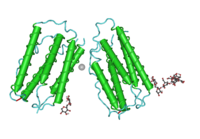
Pharmacokinetics of the Multi‐kinase Inhibitor Pexidartinib: Mass Balance and Dose Proportionality
Sign Up to like & getrecommendations! Published in 2022 at "Clinical Pharmacology in Drug Development"
DOI: 10.1002/cpdd.1186
Abstract: Pexidartinib is an oral small‐molecule tyrosine kinase inhibitor that selectively targets colony‐stimulating factor 1 receptor. Two phase 1 single‐center trials were conducted in healthy subjects to determine the absorption, distribution, metabolism, and excretion of pexidartinib… read more here.
Keywords: kinase inhibitor; pexidartinib; mass balance; dose proportionality ... See more keywords

P11.56 Oncolytic virus and tumor microenvironment modulators an alliance to fight glioblastoma
Sign Up to like & getrecommendations! Published in 2019 at "Neuro-Oncology"
DOI: 10.1093/neuonc/noz126.202
Abstract: Glioblastoma is the most common and malignant brain tumour in adults with a dismal overall survival. Several works demonstrated that its tumoral microenvironment is enriched of immunosuppressive cell populations resulting in a challenge for its… read more here.
Keywords: microenvironment; delta act; glioblastoma; treatment ... See more keywords

Pexidartinib Provides Modest Pain Relief in Patients With Tenosynovial Giant Cell Tumor: Results From ENLIVEN
Sign Up to like & getrecommendations! Published in 2022 at "Clinical Orthopaedics and Related Research"
DOI: 10.1097/corr.0000000000002335
Abstract: Abstract Background The double-blind, randomized, placebo-controlled phase 3 study of orally administered PLX3397 in patients with pigmented villonodular synovitis or giant cell tumor of the tendon sheath (ENLIVEN) showed that pexidartinib provides a robust objective… read more here.
Keywords: response; worst pain; pexidartinib; pain ... See more keywords

Abstract A080: A phase 1 study of single-agent pexidartinib in Asian patients with advanced solid tumors (NCT02734433)
Sign Up to like & getrecommendations! Published in 2018 at "Clinical Trials"
DOI: 10.1158/1535-7163.targ-17-a080
Abstract: Background: Pexidartinib is a novel, orally active, small-molecule kinase inhibitor that selectively targets the colony-stimulating factor-1 receptor (CSF1R), as well as the receptors c-kit and oncogenic Flt3. Based on these targets, pexidartinib may inhibit tumor… read more here.
Keywords: phase; asian patients; pexidartinib; study ... See more keywords

Abstract 2020: Identification of abnormal CSF1 transcripts in tenosynovial giant cell tumors and dose-dependent increase in plasma CSF1 levels in response to pexidartinib treatment
Sign Up to like & getrecommendations! Published in 2020 at "Clinical Trials"
DOI: 10.1158/1538-7445.am2020-2020
Abstract: Background: Tenosynovial giant cell tumors (TGCTs) are characterized by rearrangements of the colony-stimulating factor 1 (CSF1) gene. Dysregulated CSF1 may attract CSF1 receptor (CSF1R)-bearing mononuclear cells that form the bulk of the tumor. CSF1R inhibitors… read more here.
Keywords: tenosynovial giant; giant cell; plasma csf1; pexidartinib ... See more keywords